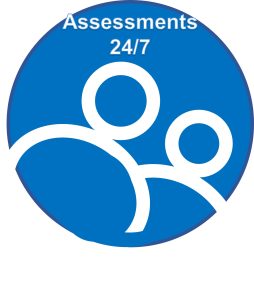Published with Permission from Assessments 24/7.

This is the first of a continuing Monday blog series; our regular coaching blog will be published on Thursday’s.
As the world’s most popular behavioral assessment, DISC offers a simple solution with profound results. Learn how to identify the behavioral styles of others and adapt your communication to increase sales, assemble teams, target new hires, develop “rockstar” leaders, and more.
Why choose DISC over any of the numerous other assessments that are available?
- DISC is simple, practical, and easy to learn and remember.
- DISC not only helps you understand your own needs-based behaviors, emotions, and fears, it also helps you to identify those same things in others. In this way, we are able to understand how to communicate effectively with people, no matter their style blend.
- DISC recognizes that people change over time and in specific situations, and relationships rather than putting you in a particular “box” for life.
- Always look into the validity and reliability of any assessment; DISC has a long history of strong performance in both.
The Four DISC Behavioral Styles
This DISC behavioral assessment measures and provides insight into four primary behavioral tendencies and emotions. It explores how these come together in a personal blend of style to create our DISC style.
THE FOUR DISC BEHAVIORAL STYLES – Overview of Behaviors
Dominance – High “D” Style
- Decisive actions and decisions
- Likes control; dislikes inaction
- Prefers maximum freedom to manage self and others
- Cool, independent, and competitive
- Low tolerance for feelings, attitudes, and advice of others
- Works quickly and impressively alone
- Good management skills
Influence – High “I” Style
- Spontaneous actions and decisions
- Likes involvement/engagement/fun
- Dislikes being alone
- May exaggerate and generalize
- Tends to dream and gets other caught up in dreams
- Jumps from one activity to another
- Works quickly and excitedly with others
- Seeks acceptance and acknowledgment, social approval
- Good persuasive skills
Steadiness – High “S” Style
- Slow to act and make decisions
- Likes close, personal relationships
- Dislikes interpersonal conflict
- Supports and actively listens to others
- Struggles with specific goal setting and self-direction
- Has excellent ability to gain support from others and give support to others
- Works deliberately and cohesively with others
- Seeks security and belonging in all interactions
- Good counseling skills
Conscientiousness – High “C” Style
- Takes cautious action and makes careful decisions
- Likes organization and structure
- Dislikes involvement, prefers to work independently
- Asks many questions about specific details to gather all information
- Prefers objective, task-oriented, intellectual work environment
- Wants to be right, so can be overly-reliant on data collection
- Works slowly and precisely
- Good problem-solving skills
The next blog will review the strengths and challenges for each style.




